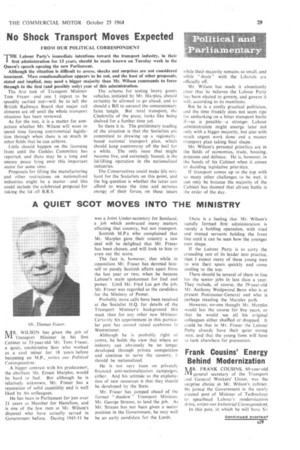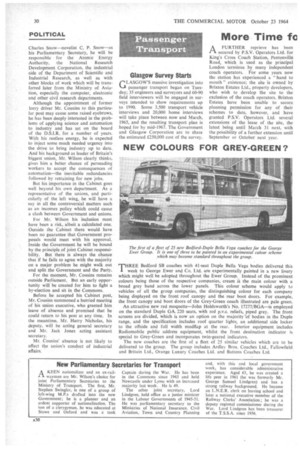A QUIET SCOT MOVES INTO THE MINISTRY
Page 31

Page 32

If you've noticed an error in this article please click here to report it so we can fix it.
]/JR. WILSON has given the job of IVI Transport Minister in his first Cabinet to 53-year-old Mr. Tom Fraser, a quiet, unobtrusive Scot who worked as a coal miner for 18 years before becoming an M.P., writes our Political Correspondent.
A bigger contrast with his predecessor, the ebullient Mr. Ernest Marples, would he hard to find. But although he is relatively unknown, Mr. Fraser has a reputation of solid capability and is well liked by his colleagues.
He has been in Parliament for just over 21 years as Member for Hamilton, and is one of the few men at Mr. Wilson's disposal who have actually served in Government before. During 1945-51 he was a Joint Under-secretary for Scotland, a job which embraced many matters affecting that country, but not transport.
Scottish M.P.s who complained that Mr. Marples gave .their country a raw deal will be delighted that Mr. Fraser has been chosen, and will look to him to even out the score.
The fact is, however, that while in opposition Mr. Fraser has devoted himself to purely Scottish affairs apart from the last year or two, when he became Labour's main spokesman for fuel and power. Until Mr. Fred Lee got the job, Mr. Fraser was regarded as the candidate for the Ministry of Power.
Probably more calls have been received at the Socialist H.Q. for details of the Transport Minister's background this week than for any other new Minister. Certainly his appointment in this particular post has caused raised eyebrows in Westminster.
Although he is probably right of centre, he holds the view that where an industry can obviously be no longer developed through private competition and continue to serve the country, it should be nationalized.
He is not very keen on privately financed anti-nationalization campaigns, either. And his attitude to the exploitation of new resources is that they should be developed by the State.
Mr. Fraser has jumped ahead of the former " shadow" Transport Minister, Mr_ George Strauss, to land the job_ As Mr. Strauss has not been given a senior position in the Government, he may well be an early candidate for the Lords.
There is a feeling that Mr. Wilson's rapidly formed first administration is merely a holding operation, with tried and trusted servants holding the front line until it can be seen how the younger inen shape.
If the Labour Party is to carry the crusading zest of its leader into practice, then I expect many of these young men to win their spurs quickly and come jostling to the top.
There should be several of them in line for the senior jobs in less than a year, They include, of course, the 39-year-old Mr. Anthony Wedgwood Berm who is at present Postmaster-General and who is perhaps treading the Marples path.
However, no-one thought Mr. Marples would last the course for five years, or that he would see all his original colleagues either shuffled or dropped. It could be that in Mr. Fraser the Labour Party already have their quiet strong man, and that the young lions will have to Look elsewhere for promotion.
Frank Cousins' Energy Behind Modernization
i‘AR. FRANK COUSINS, 60-year-old iv". general secretary of the Transport and General Workers' Union. was the surprise choice in Mr. Wilson's cabinet He joined the Government in the newly created post of Minister of Technology, to spearhead Labour's modernization drive, writes our Industrial Correspondent.
In this post. in which he will have Si] Charles Snow—novelist C. P. Snow—as his Parliamentary Secretary, he will be responsible for the Atomic Energy Authority, the National Research Development Corporation. the industrial side of the Department of Scientific and Industrial Research, as well as with other blocks of work which will be transferred later from the Ministry of Aviation, especially the computer, electronic and other civil research departments.
Although the appointment of former lorry driver Mr. Cousins to this particular post may cause some raised eyebrows, helms been deeply interested in the problems of applying science and automation to industry and has sat on the board of the D.S.I.R. for a number of years. With his restless energy, he is expected to inject some much needed urgency into the drive to bring industry up to date. And his background as leader of Britain's biggest union, Mr. Wilson clearly thinks, gives him a better chance of persuading workers to accept the consequences of automation—the inevitable redundancies followed by retraining for new jobs.
But his importance in the Cabinet goes well beyond his own department. As a representative of the unions, and particularly of the left wing, he will have a say in all the controversial matters such as an incomes policy which could cause a clash between Government and unions.
For Mr. Wilson his inclusion must have been a risk, albeit a calculated one. Outside the Cabinet there would have been no guarantee that Government proposals would meet with his approval. Inside the Government he will be bound by the principle of joint Cabinet responsibility. But there is always the chance that if he fails to agree with the majority on a major problem he might walk out and split the Government and the Party.
For the moment, Mr. Cousins remains outside Parliament. But an early opportunity will be created for him to fight a by-election and sit in the Commons.
Before he accepted his Cabinet post, Mr. Cousins summoned a hurried meeting of his union executive, who granted him leave of absence and promised that he could return to his post at any time. In the meantime, Mr. Harry Nicholas, his deputy, will be acting general secretary and Mr. Jack Jones acting assistant secretary.
Mr. Cousins' absence is not likely to affect the union's conduct of industrial affairs.
Glasgow Survey Starts GLASGOW'S massive investigation into passenger transport began on Tuesday; 35 engineers and surveyors and 60-90 field interviewers will be engaged in surveys intended to show requirements up to 1990. Some 3,500 transport vehicle interviews and 20,000 home interviews will take place between now and March, 1965, and the resulting transport plan is hoped for by mid-1967. The Government and Glasgow Corporation are to share the estimated g250,000 cost of the survey.




















































































































